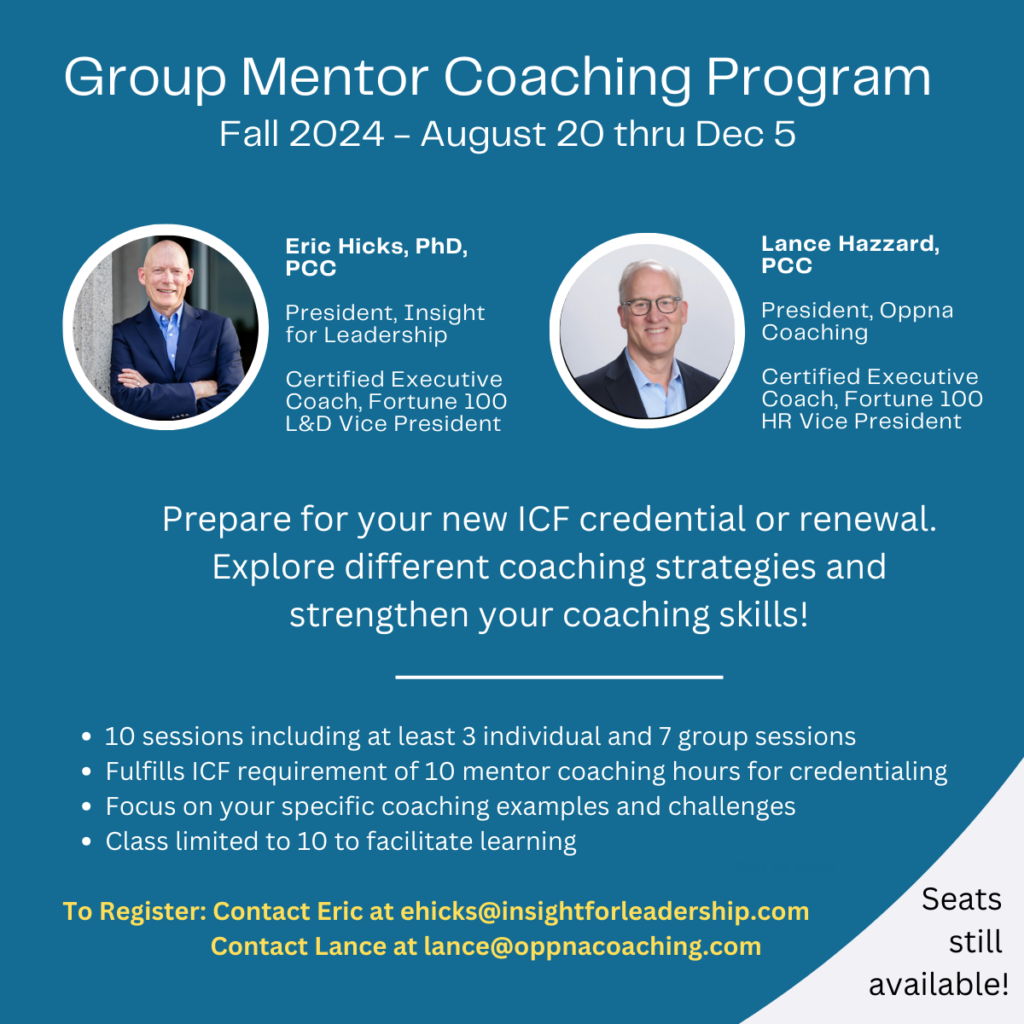Learning from Coaching Mentors in Your Field

By Lance Hazzard, PCC, CPCC and Eric Hicks, PhD, PCC
Any way you define it, if you’ve had career success you’ve no doubt had at least one mentor who played an invaluable role in your professional life. And beyond your professional life, you probably count many individuals as mentors, those you’ve viewed as role models who have helped shape you into the person you are today.
Some progressive organizations have active mentor programs for developing their talent, and aid in aligning the mentor/mentee relationship for the purpose of sharing knowledge, experience or expertise based on the criteria set up by the enterprise. Most organizations, however, do not offer active mentor programs, leaving employees to fend for themselves and seek out individuals they admire who are willing to mentor them in their chosen field.
The International Coaching Federation (ICF) is an organization that requires mentor coaching as part of the process for holding professional designations. To obtain or renew professional designations, such as Associate Certified Coach (ACC) and Professional Certified Coach (PCC), mentor requirements must be met.
Since becoming an ICF certified coach requires working with a mentor coach, some people ask about the differences between mentoring and coaching. The chart below highlights these differences. It’s a compilation taken from several sources, including articles in Forbes, Catalyst.org, Mentorship Moment, our book, Accelerating Leadership, along with our own experiences in mentorship and coaching:
| Mentor | Coach | |
| Definition: | A confidential, structured developmental partnership with clearly defined goals, roles, expectations and timeframes. A mentor informally or formally helps you navigate your career, providing guidance for career choices and decisions. | A confidential partnership designed to unlock people’s potential to maximize their own performance and goal attainment. A coach allows and supports the employee to discover and develop strategies for success. A coach provides guidance for your development, often focused on “soft skills” as opposed to technical skills of a position. |
| When to Use: | To get good, tailored developmental or career advice. | To aid in your skill and personal or leadership development and accelerate change or performance. |
| How to Use: | Work with Mentor to get advice that augments your learning, adds experienced perspective in your field and is tailored to your professional agenda. | Work with Coach as a catalyst for your professional or personal development. Coaching is a continuous process that helps equip you to develop yourself. |
| Starting the Relationship: | To be identified or requested by you. Mentors typically share insights and lessons from their personal experiences. It is often best if your Mentor is in your profession, function or organization and has successfully navigated their career. | To be identified or requested by you. Talk to two or more coaches after reviewing their coaching bios or resumes. Coaches help you to create the conditions for learning and behavior change to occur. |
| Driving the Relationship | You drive the relationship while your mentor responds to your requests and adds perspective and experience. You typically own the agenda. | You and your coach partner in driving the relationship. You may request coaching on a topic and the coach may ask a number of questions to get to the reasons for the topic or help you discover the real topic. It’s a co-active partnership where the coach may provide non-judgmental feedback or constructive insights that allow you to achieve better results. You may own the agenda or, at times, the coach will suggest agenda items based on the nature of the coaching. |
Both mentors and coaches can be beneficial to help you obtain your goals; at times, there may be overlap.
For coaches who need to work with a mentor coach to fulfill or renew a designation, it often makes the most sense to partner with a mentor coach in your selected coaching niche, such as life coaching, business coaching, executive coaching, etc. This allows you to gain insights and tailor development relevant to your needs.
ICF maintains the purpose and requirements for mentor coaching based on the various designations on their website: Mentor Coaching – International Coaching Federation
Mentor coaching can be individual or group coaching. If group coaching, at least three hours of the required ten must be individual coaching. Group coaching often allows for broader situations to be covered in a confidential setting while growing relationships with fellow coaches in your area of practice.
If you need to fulfill or renew your ACC or PCC coaching credential before December 31, and your coaching niche is in the areas of Executive, Business, Leadership, Organizational, Career or Transition Coaching, you may be interested in the following Group Mentor Coaching Program:

Mentor coaching is required for meeting your ICF ACC or PCC credential requirements. How can a Group Mentor Coaching Program provide you with enhanced contacts and relationships in your chosen practice of coaching while fulfilling the mentor coaching requirement?
##
Lance Hazzard, PCC, CPCC, is a certified Executive Coach and Executive Team Coach helping people and organizations achieve success. Lance and Eric T. Hicks, Ph.D., co-authored Accelerating Leadership, published in June 2019. Lance is Executive Coach and President at Oppnå® Executive & Achievement Coaching. Eric is President at Insight for Leadership. More information on the book, Lance and Eric can be found at the links below: